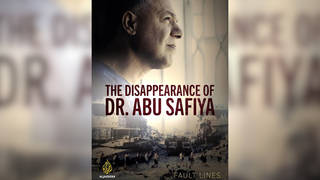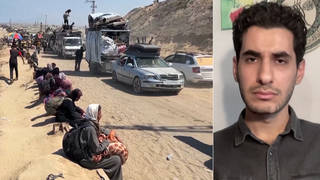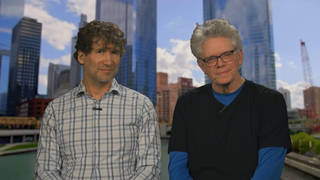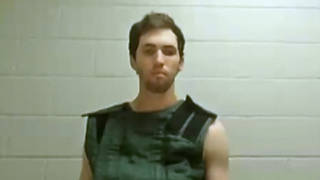
Topics
Guests
- Augusto Boallegendary Brazilian political playwright and popular educator, interviewed in June 2007.
Augusto Boal, the legendary Brazilian political playwright and popular educator, died Saturday at the age of seventy-eight. He was the founder of the Theater of the Oppressed, a popular international movement for a participatory form of theater as a means of promoting knowledge, democratic forms of interaction, and transformation. We play a never-before-aired interview on his life and work. [includes rush transcript]
Transcript
AMY GOODMAN: Augusto Boal, the legendary Brazilian political playwright and popular educator, died this weekend at the age of seventy-eight. He was the founder of the Theater of the Oppressed, a popular international movement for a participatory form of theater as a means of promoting knowledge and democratic forms of interaction. Boal conducted workshops all over the world. His techniques of using theater to discuss power and oppression have been widely inspirational and influential.
In 1971, the Brazilian military dictatorship imprisoned and tortured Boal for four months. After his release, he was forced into exile for fifteen years. He’s written a number of books, including Theater of the Oppressed and Games for Actors and Non-Actors, as well as The Rainbow of Desire and Legislative Theater. In the ’90s, Boal also served as a city councilmember for Rio de Janeiro.
Boal was tireless ’til the end of his life. According to a statement from the Center for the Theater of the Oppressed in Rio, Boal left behind a completed new version of his book The Aesthetics of the Oppressed, and he spent the day before his death, May Day, in a solidarity vigil with workers.
Later this month, Augusto Boal’s son Julian Boal will be in New York leading workshops at the Brecht Forum on the techniques developed by his father and performing them at Riverside Church on May 25th.
I interviewed Augusto Boal here in the firehouse studio in June of 2007. This interview, we never aired before. I began by asking him to describe the Theater of the Oppressed.
AUGUSTO BOAL: Theater of Oppressed is theater in what it is more essential. It is not theater in a playhouse, not theater with written script, not theater like — some theater become the cemeterial theater, because theater is what we have inside. We are animals that have the privilege of being actors, because we are acting all of the time. But at the same time, we are spectators of our actions. Most animals or most none of them, only some dolphins, some elephants, some — I don’t know what — can do that, can do — can observe themselves in action. So we have theater inside, because we act and we are the observer. We are the spectators.
At the same time, when we get together many people looking at one point, they create a space which is different from the physical space. It’s more than a physical space. It is pentadimensional, not three dimensions. It has also memory and imagination. So we create the theatricality.
And third, we use the language that the actors use on stage. So there is no difference. When we are in love with someone, we talk differently than if we hate the person; we don’t talk in the same way. So we do exactly what the actor does on stage, but the actor has the conscious of that, and we don’t have it in normal life, in daily life.
AMY GOODMAN: What do you mean, “we”? Who is we?
AUGUSTO BOAL: It’s all of us. It’s the — any people, but especially, in our case, the oppressed. We believe that all relationship between humans should be a dialogue on nature. We should have the moment in which we listen to the audience, moment in which we speak. But we know that between men and women, between blacks and whites, between north hemisphere countries and south hemisphere, all those dialogues, they become very soon a monologue, in which only men speak, only whites speak, only the north hemisphere speak. And then we want to reestablish the dialogue. We want to have the right also to say our words. So that’s what “we” mean, mean us, the oppressed, be it oppressed — sexually oppressed, be salary oppressed, be politically oppressed; any kind of oppression, we fight against.
AMY GOODMAN: And talk about what inspired you, Augusto, how you founded the Theater of the Oppressed.
AUGUSTO BOAL: Well, always I was very much preoccupied with that, because I — my father, he was a —- had a bakery. And sometimes, when I -—
AMY GOODMAN: Where?
AUGUSTO BOAL: In Brazil, in Rio de Janeiro, in the working quarters of Rio. And then, every morning that I went to work with my father, when I was twelve, thirteen, fourteen years old, and then I saw all those workers, and I saw how they were oppressed. And always, I was preoccupied with them. I was fascinated by how could they not rebel if they were so oppressed.
And then, my beginning, it was at fifteen years old; I started writing plays about them. And I was in a moment in which I thought that as I was not oppressed as their oppression, I was not in the same circumstance, and I was pretending to be an artist, I was superior in some way. And then I said, “I’m going to teach them what they have to do to fight.” So I entered in the line of the political theater of the ’50s, of the ’60s, in which they had messages to give.
And one day I learned that I did not know more than they did, unless in the theater. In the theater, yes, I knew more. But their lives, they knew more than I. And it happened on a day when I was working for peasants in the northeast of Brazil, and I was doing a play in which the protagonist said, at the end said, “We have to spill our blood to save our land.” And then we were all singing, dressed like peasants. We were not peasants; looking like peasants, but we were not peasants, and saying, “You have to spill your blood, our blood, to save our lands, to reconquer.”
And then a peasant came to us and says, “Well, you think exactly like we do. So why don’t you take your rifles,” because we had rifles on stage, very beautiful, colorful rifles, and he said, “Why don’t you come with your rifles, and let’s go to fight against some landowners that occupied our land. We have to spill our blood.” And then we said, “Forgive us, but our rifles, they are not true. They are fake. They are setting rifles.” And he said, “OK, the rifles are not true. They are not real rifles. But you are sincere, so you come, because we have rifles for everybody. Let’s fight against them.” And then we said, “No, we are truly artists, not truly peasants.” And he said, “When truly artists say, ‘Let’s spill our blood,’ you are talking about our true blood of truly peasants and not about yours.”
So I understood that we could not give a message to women, because we are men; to blacks, because we are white; to peasants, because we live in the city. But we can help them to find their own ways of fighting.
AMY GOODMAN: Augusto Boal, you, yourself, were imprisoned. When? By whom?
AUGUSTO BOAL: It was in ’71, in ’71, exactly, because in the beginning of the Theater of the Oppressed, we were doing the first form, which was called newspaper theater, in which we try — as we had been persecuted by the police, by the paramilitary organizations, and persecuted really, not — we were not paranoiac. But sometimes we had to go on stage with a loaded gun in our pockets. And it was not paranoia; it was self-defense. And so, the situation was so terrible. To do theater was such a risk always, to do the kind of theater in favor of the population and against the dictatorship. It was so terrible that we had to take that protection. And then, OK, during that time, they were arresting people, killing people, torturing people. And I was one of them that were arrested. And happily, I am alive.
AMY GOODMAN: How did that experience change your view also of theater?
AUGUSTO BOAL: In some way, it had been changed before we did this episode, in which I found that I was telling — giving advice to someone, but I was not able to take the same risks. Che Guevara used to say something very beautiful. He said, “To be solidarity is to take the same risks.” And I was not taking any risk. I went there, I did the play, and then “Go and fight,” and I take the plane back home. So my — had already changed.
But at the same time, to be in a solitary cell, to be alone there, not talking to anybody anytime, and most of the time not seeing anybody, made me, for the first time in my life, to listen to silence. I had never listened to silence. I listened to sounds. But I listened to sounds. And then, in that moment, I learned. I learned that in this moment of the silence, your thoughts, they become more concrete, almost objects.
And then, when I was moved from this cell to a cell with many other prisoners, political prisoners, I learned something very important also, that when we are free in space, we are arrested in time. We have to go look at the watch. It’s what time? And we have to go here, we have to go there. We are arrested in time. And when we are arrested in space, we have the free time. We have the liberty of using our time.
AMY GOODMAN: Describe what has happened since the dictatorship and how things have changed in Brazil under Lula.
AUGUSTO BOAL: Things changed, yes. There is no more censorship. We can do anything in the theater. But during many years, it was more or less the same idea, the same ideas, that prevailed from before. It started to change with Lula, when he was elected. And then it really changed. Now Brazil is no longer what it was ten years ago.
What did not change yet and that I regret, but I don’t know why it did not, is the agrarian reform. The land is still in the hands of those people who robbed the land, because they did not really buy nothing. It’s false; their documents are false.
AMY GOODMAN: Talk about the MST, the landless people’s movement in Brazil.
AUGUSTO BOAL: Yes. I worked before with the Peasants League in 1960 until ’64. What they had wrong, it was that they had one person, Francisco Juliao, who was the boss, let’s say, so — of the Peasants League. He was the leader, and he decided many things, and the peasants obeyed. So this was not good.
The movement of peasants without land now, the MST, know. They are democratic. They decide. Each group decides. They have general laws, internal law that they have to abide by. But the tactics are decided by each group. So sometimes one group does things that the central direction, which is really democratic, because they have many people there from many parts of Brazil, they would not approve, but they did it. They say, “Don’t do that.” They discuss. So they are democratic. They never invade lands; they occupy lands. The land that are not productive, they occupy.
AMY GOODMAN: How many are part of MST?
AUGUSTO BOAL: How many people? Oh, millions. I don’t know. I don’t know exactly how many, but several millions, yeah.
AMY GOODMAN: And yet, here, with Lula, who was talking agrarian reform before he was in power, and with the power of the landless people’s movement, it still hasn’t changed.
AUGUSTO BOAL: It still hasn’t changed. And it has changed, to tell the truth, yes, but not as much as we need it to change. And this comes also from the politics of Lula. Even when he was a worker and a president of the trade union, he was a negotiator. He has the habit of negotiate. ANd then, in the parliament, there are many people that represented the landowners, and they have a force, and they can prevent Lula from doing certain things. And I believe that’s a negotiation that is there. But I believe that he still has three years and a half to go, and many things are going to be done in those three years and a half.
AMY GOODMAN: What does the United States look like from the south, when you look up to the United States?
AUGUSTO BOAL: I think that from the south, from the north, west and the east, and from up, if we look at the United States, what we see, we see a country that is doing what they want. And not a country — we see a group of people or corporations that decide what they want to do. And they don’t respect anything. They don’t respect for.
They invaded Iraq. Now, more than half-a-million people, Iraqis, were killed, not by United States only, but also among themselves. Three thousand and five hundred US soldiers were killed. I don’t know how many billions were spent with that war. And they did that, because they said, “Oh, they have weapons of massive destruction.” And then the United Nations says, “No, they don’t have.” “Oh, yes, they have. So I go there anyway.” They invade wherever they want. They are used to that.
And we cannot appreciate that type of government. I have so many friends here in the United States. I love those friends, and I love many things here. But I cannot accept a government that does what they want and they don’t care absolutely for the public opinion or for the opinion of other countries. They do what is in their interest.
Even that billions and billions of money that were spent, in reality, it was not thrown away in the garbage. It changes the hands. That’s the money that comes from the population, from the taxes, from all that, that belongs to the state. And it goes to whom? To those who provide the weapons, to those who provides the uniform, to those — so it changed. It’s not that they burned the money. They changed the hands that have that money. So, we cannot, even though we are sympathetic of the US revolution against England, it was very nice, we have lots of heroes here, and we appreciate so many things here, but the government that does what they want without any consultation with the population itself, because I don’t believe that the population of the United States is in favor of the war. I don’t believe. Many people are, but not the great majority, I believe not.
AMY GOODMAN: Augusto Boal, what do you still hope to accomplish?
AUGUSTO BOAL: I hope so many things. I hope so many things. I always say that we are always looking after a dream. And we know that a dream is a dream. But that’s the function of a dream, is to be a dream. It’s not to be — not to get there. You have to have always a dream.
And I only have one dream. It’s to dream all my life. That’s my only dream. I would like to go on dreaming. And if I can dream of things, well, I dream of solidarity among men and women, black and white, solidarity among countries, and solidarity to create ethics.
What we think sometimes, we don’t think that there is a difference between moral and ethics. Moral is mores. It’s customs. And it was moral in this country, my country — slavery. It was moral. It was moral to buy a human being. So I’m not moralist, because I know that in moral there are horrible things. But I am ethical. We need to create an ethos. In Greek, it means the tendency to some kind of perfection. And my kind of profession is solidarity, is dialogue, is democracy — real democracy, not one that we see. That’s my — I want to — not to accomplish, because to accomplish — not to accomplish, to go on. To go on.
There is a poet, a Spanish poet, Antonio Machado, who says, “The path does not exist. The path, you make by treading on it. By walking, you make the path.” So we don’t know where the path leads, but we know the direction of the path that we want to take. That’s what I want, and not to accomplish, but to follow, until I can’t.
AMY GOODMAN: Well, thank you for making your path here today.
AUGUSTO BOAL: Thank you very much.
AMY GOODMAN: Augusto Boal, the legendary Brazilian political playwright and popular educator. He died on Saturday at the age of seventy-eight. He was the founder of the Theater of the Oppressed, a popular international movement for a participatory form of theater. He was inspired by Paulo Freire, who wrote The Pedagogy of the Oppressed. Among the books written by Augusto Boal, well, The Theater of the Oppressed.












Media Options